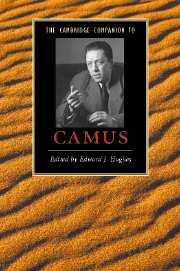Book contents
- Frontmatter
- Introduction
- PART I: BIOGRAPHY AND INFLUENCES
- PART II: THEMES, PREOCCUPATIONS AND GENRES
- 4 Rethinking the Absurd: Le Mythe de Sisyph
- 5 Camus and the theatre
- 6 Camus the journalist
- 7 Camus and social justice
- 8 Violence and ethics in Camus
- 9 Camus and Sartre: the great quarrel
- 10 Portraits of women, visions of Algeria
- PART III: TEXTS AND CONTEXTS
- Postface
- Guide to Further reading
- Index
- Series List
7 - Camus and social justice
from PART II: - THEMES, PREOCCUPATIONS AND GENRES
Published online by Cambridge University Press: 28 September 2007
- Frontmatter
- Introduction
- PART I: BIOGRAPHY AND INFLUENCES
- PART II: THEMES, PREOCCUPATIONS AND GENRES
- 4 Rethinking the Absurd: Le Mythe de Sisyph
- 5 Camus and the theatre
- 6 Camus the journalist
- 7 Camus and social justice
- 8 Violence and ethics in Camus
- 9 Camus and Sartre: the great quarrel
- 10 Portraits of women, visions of Algeria
- PART III: TEXTS AND CONTEXTS
- Postface
- Guide to Further reading
- Index
- Series List
Summary
Across the range of Camus's writings, two terms repeatedly ring out as the expression of his fundamental concerns: 'man' and 'justice'. The two are profoundly linked: Camus's resolute belief in the importance of social justice, and his contributions to the global political debates of his time - including those concerning the Second World War, colonialism, the atom bomb and the Cold War - are inseparable from his affirmation of the values he attaches to the figure of the human. It is impossible to find an example of a key Camusian intervention in the cause of social justice which does not argue its case via reference to the human as its core locus of value. This chapter tries to address Camus's concern for social justice by exploring some of its moral and conceptual frameworks. I do not propose to detail Camus's various interventions as such, as these are discussed elsewhere in this volume. Rather, with reference to some of these key moments, I will attempt to draw out something of the values by which Camus is driven. And I will be using the figure of the human as the common thread by which these values are held together (or, at times, by which they are held in tension). Sometimes, this figure expresses a virile, heroic resolve; sometimes, it can be pathetically vulnerable. But for Camus, 'man' will never quite be effaced; and the point of this persistence is the call for justice it unceasingly articulates. My aim here will be to provide some sense of this irreducible value of resistance.
- Type
- Chapter
- Information
- The Cambridge Companion to Camus , pp. 93 - 105Publisher: Cambridge University PressPrint publication year: 2007
- 4
- Cited by

